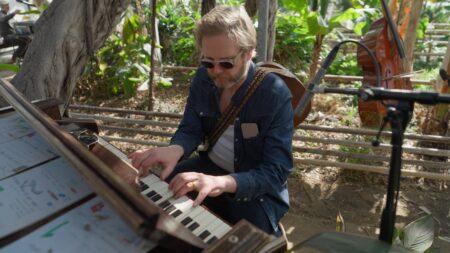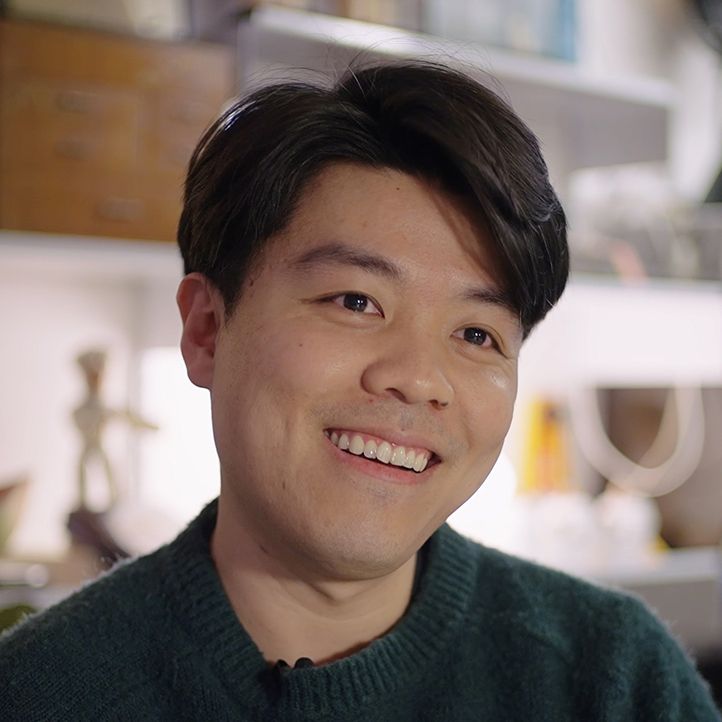Continue playing
(Time remaining: )
Play from beginning
Continue playing "{{ controller.videos[controller.getVideo(controller.currentVideo)].segmentParentTitle}}"
{{controller.videos[controller.getVideo(controller.currentVideo)].title}} has ended.
The Freedom of AnimationWong Ping
In the busy streets of Hong Kong, artist Wong Ping seeks inspiration in everyday interactions. Wong’s work in animation began as an escape from his nine-to-five job, taking his reflections on social behavior and bringing them to life using vibrant colors and basic geometric shapes. For Wong, animation offers a way to express potentially unsavory thoughts and stories from his observations and personal life without fear of judgment. In his own words: “Animation as a medium gives me freedom. It’s almost like a candy-wrapping paper for people—it’s easier to swallow.” With this artistic freedom, he creates tales that explore and critique aspects of social life like normative morality and sexual taboos. In Wong Ping’s Fables 1 (2018), he brings a new twist to the standard fable, infusing the form with contemporary relevance. Each fable serves as a container for his observations of social behavior, each thought connected within a single narrative setting.
In the midst of the COVID-19 pandemic, when virtual interaction became a widespread norm, Wong created a mockumentary using digital conferencing called Zoom In: The Great Tantalizer (2022). In the video, the artist hosts a collection of experts who each speak about “the Great Tantalizer,” a fictional scientist celebrated for his innovations in panda arousal. For his 2022 exhibition, The Great Tantalizer, the artist recreated the abandoned laboratory of the Tantalizer, featuring posters with cartoon images of pandas in erotic scenarios and animated pornography designed for pandas. Sex and taboo are common in Wong’s animations, used as narrative containers to explore human psychology. “Why I enjoy and explore desire often is because we have to make choices,” says Wong. “In bed, people can be more honest to reveal the other side of themselves.”
During the COVID-19 lockdowns, the widespread sense of global isolation made it difficult for Wong to write new scripts. When lockdowns ended in Hong Kong, the artist opened a street-level flea market to seek inspiration, selling an eclectic collection of goods and mining his customers for new stories. “I don’t even want to put a price tag on each thing, so I force the people to talk to me,” says Wong. “It’s like forcing them to give me inspiration.” Opened in early 2023, the storefront is an experiment for the artist, representing a new chapter in his search for inspiration and the quest to make better work.
Credits
Director: Jurrell Lewis. Executive Producer: Tina Kukielski. Series Producer: Ian Forster. Camera: Patrik Wallner. Editor: Crystal Wong. Additional Camera: Luke Geissbuhler. Assistant Camera: Felix Phillips. Colorist: Max Blecker. Sound Mix: Collin Blendell. Assistant Editor: Michelle Hanks. Artwork Courtesy: Wong Ping, Tanya Bonakdar Gallery. Associate Producer: Andrea Chung. Assistant Curator: Jurrell Lewis. Music: Epidemic Sound
“Extended Play” is presented by the Marina Kellen French Foundation, with support from The Andy Warhol Foundation for the Visual Arts, public funds from the New York City Department of Cultural Affairs in partnership with the City Council, the New York State Council on the Arts with the support of the Office of the Governor and the New York State Legislature, the Art21 Contemporary Council, and individual contributors. Producers: Barbara & Andrew Gundlach.
Closed captionsAvailable in English, German, Romanian, Italian, Japanese, Korean, Chinese, Italian
Through the Art21 Translation Project, multilingual audiences from around the globe can contribute translations, making Art21 films more accessible worldwide. Translate this video now.
Interested in showing this film in an exhibition or public screening? To license this video please visit Licensing & Reproduction.
Wong Ping was born in 1984 in Hong Kong, where he currently lives and works. He received his BFA from Curtin University in Perth, Australia, in 2005 and began making animations under the name Wong Ping Animation Lab in 2010. In his short films, the artist combines deadpan Cantonese narration with brightly colored animations to tell surreal stories about subjects typically considered taboo. Ranging from provocative tales about love, lust, and revenge to darkly comic fables for the modern world, Wong’s animations tap into our collective subconscious, seeking deeper truths about the human experience.
“Animation as a media gives me freedom. It’s almost like candy wrapping paper for people; it’s just easier to swallow.”
Wong Ping

